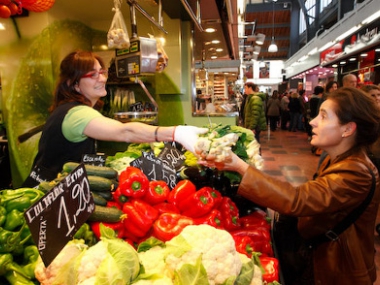URBACT project to make urban markets keys drivers of employment and entrepreneurship, urban regeneration in new implementation phase
Edited on
14 February 2017The URBACT Markets project starts a new challenge as it moves into the implementation phase of this European Union project aimed at using city markets to generate employment and entrepreneurship, redevelop urban areas, and create a more sustainable local environment.

The 800,000 Euro project includes the cities of Barcelona, London (via Westminster City Council, UK), Torino (Italy), Suceava (Romania), Dublin (Ireland), Toulouse (France), Pécs (Hungary), Wroclaw (Poland) and Attica (Greece).
The project represents a wonderful chance to learn and implement action plans to develop local employment, regenerate the city centre, create better local supply chains and use markets to drive our city forward.
Development Phase ended last October with a state-of-the-art study
The URBACT Markets project began last May 2012 in the so-called development phase along with four partner cities (London, Torino (Italy), Suceava (Romania), and Plovdiv (Bulgaria) with Barcelona leading the urban development group, London the sustainability group, and Torino the employment group. The aim was to learn best-practice from the other partners, which is part of the EU’s knowledge-sharing objectives.
Between then and last October, the cities’ representatives engaged with local stakeholders to draw up best-practice examples to create a so-called baseline study which highlights the state-of-the-art in the use of markets as tools for regenerating cities and specific neighbourhoods, creating low carbon local economies and local supply chain systems, and generating economic wealth and jobs.
The initial baseline study was designed as a preliminary stage to an implementation phase that would incorporate more partners and create further knowledge and learning experiences and finally the implementation of some of the proposals developed in partner cities and any city interested in developing its markets. This first stage had a budget of 74,000 euros.
Implementation Phase
Last January 29th, 2013, the URBACT Monitoring Committee based in Paris announced that the URBACT project had been approved to move through to the implementation phase, due to last 27 months.
The project is divided into 3 areas each led by one of the participating cities:
- Barcelona heads the technical working group on markets as motors for urban and social regeneration
- London leads the group promoting sustainability policies, both in terms of food distribution chains and efficient buildings.
- Torino is developing knowledge about how to harness markets to generate economic, employment and entrepreneurship benefits.
Participating cities will now be working for the next 7 months (February to August) to develop SWOT analyses for their own markets and a best-practice manual for each of the three areas defined above and they will also be engaging with local stakeholders to get ideas for their own markets, including market stall traders, neighbourhood associations, the local administration, etc.
The second part of the project (September, 2013 to January 2015 will see concrete proposals and action plans written up as part of local strategy plans. The entire process includes significant participation of market related stakeholders including the business associations representing market stall traders, the managers of the city's commerce, suppliers, citizens, businesses, and the institutions and other entities involved. The aim is to achieve agreement on a Local Action Plan that will be developed over subsequent years.
The final stage (until April 2015) will see the implementation of some of these plans in partner cities. One of the proposals already on the table is to organise a European Day of Markets between October, 2014, and April, 2015, in partner cities with a view to promoting markets across Europe.
Conferences and study visits
Because the idea of the project is to share information and help others learn best practice, there will be three transnational seminars organised for all partners highlighting issues faced by partners and providing updates on city projects, and there will also be thematic conferences by experts on specific issues related to the three core areas of the objective. Study visits are also to be organised to help the transfer of knowledge between partners.
Benefits of participating in URBACT for (City Name)
Cities will gain from participating in this URBACT Markets projects in a number of ways:
· The drafting and approval of a comprehensive Action Plan for our local markets
· The identification and promotion of new best-practice policies, investments and initiatives
· Generation of knowledge about markets that can be ‘exported’ to other similar cities to ours
· Capturing EU and other sources of funding
Markets fit perfectly with the new European strategy for SMART cities because they are a tool for developing architectural and neighbourhood regeneration, job creation and economic dynamism, local supply chains, and they can promote the values required by the sustainable cities of the future: promoting local produce, local mobility, healthy eating, and interaction between farming and city communities and they also create spaces of urban centrality and interaction.
URBACT Markets represents an opportunity to be part of setting the European agenda for markets and perhaps further financing opportunities, as well as strengthening our public-private management model.
Submitted by admin on




